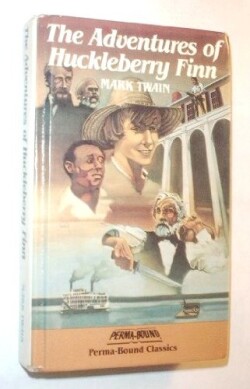Review: Mark Twain’s “The Adventures of Huckleberry Finn”
by Miles Raymer

When family and friends started raving about Percival Everett’s James, I decided it was time to revisit Twain’s original text before exploring Everett’s take on this American classic. I’ve only read it once before, and it was so many years ago that I only remembered the very basics of the story. After traveling down the Mississippi again, I’m left with mixed feelings. The Adventures of Huckleberry Finn is a strange book.
I’ll lead with what I did not like. Maybe it’s my technology-addled 21st-century brain talking, but I found this book to be extremely boring. Page for page I found very little to keep my attention, and although it was fun at first to decipher the dialects, after the opening chapters this became more of a chore than a continued pleasure. I think for many readers the novel’s meandering pace is a plus, much like a lazy day spent going with the flow on your favorite river. But the book couldn’t keep my attention most of the time, and I had to make myself go back to it instead of feeling like I was being pulled back by a natural desire to continue.
The other thing that wore me down is a standard complaint that became standard for good reason: this book’s ending is one of the worst of any canonical piece of literature I have read. The combination of silliness and cruelty that characterizes Huck and Tom’s treatment of Jim during his confinement is sickening, and aside from Jim finally being freed by Miss Watson’s will, I couldn’t find any redeeming qualities in how the story wrapped up. As Keith Neilson rightly points out in the book’s Afterword: “One of the great characters in literature has been forced to go backwards and we feel cheated. I doesn’t ruin the book, but it does damage it” (295).
It’s true that the deficient denouement doesn’t fully doom the novel. There were several excellent currents in the story that pulled me along. The book is undeniably funny, which readers with a better sense of humor than myself will surely appreciate. The writing captures a particular moment in American history with authenticity and verve, sending us back in time in a fashion that befits classic literature. Twain’s sense of irony is top-notch, and he proves himself capable of grasping of what’s ethically at stake in a society that practices and normalizes slavery. The moments of true understanding and friendship that are shared by Huck and Jim are touching, and the scene where Huck decides that he’d rather go to hell than send Jim back into bondage left me in tears.
I’ll end with what I found to be the most inspiring and multifaceted aspect of Twain’s text. With all its heart, this is a novel about what it means to be free in America. In this great and terrible nation, American freedom takes many shapes. Folks are free to drink themselves to death, like Huck’s father; they’re free to practice their religion in the way they see fit, like Miss Watson and Widow Douglass; they’re free to hunt and kill their enemies in cold blood, like the Grangerfords and Shepherdsons; they’re free to lie and cheat people out of their hard-earned money for as long as they can get away with it, like the Duke and King; and they’re free to overcomplicate and romanticize every situation––and to completely fail to grasp the baleful effects of doing so––like Tom Sawyer. But most of all, they’re free to just be, to make up their own damn minds about what life is and how it ought to be lived. Twain’s commitment to freedom of thought and movement not only validates Huck’s passionate pursuit of the chance to “feel mighty free and easy and comfortable on a raft,” but also contains a powerful condemnation of a society that would deny that freedom to someone based on something as arbitrary as their skin color. Huck and Jim’s journey, therefore, is a perfect metaphor for the American Dream, in all its genuine glory and painful perfidy (116).
Okay, Twain, I tried to articulate the moral of your story. I’ll take my banishment now.